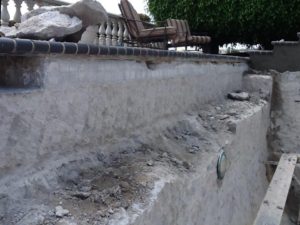What is Rebound and How Can It Be Repaired?

One of the surprise issues that can arise when remodeling a pool is rebound. Rebound is not something that can typically be seen until after the pool finish has been chipped away in preparation for a new finish, therefore, it is a surprise additional cost for the pool owner. Rebound must be remedied prior to applying the new finish. Otherwise, no remodeler will warranty the finish for cracks or delamination.
What Is Rebound?
Gunite was used for many years to build the shell of a pool. Gunite was not troweled onto the pool like a cement sidewalk is poured and troweled. Instead, the dry material of gunite was mixed at the truck, water added at the nozzle to it as it is sprayed by the operator at the pool, shot from a large hose connected to a high-powered compressor onto the walls and floor of the pool, forcing it to condense into a high-density material, with the goal of a minimum of 2,500 PSI (Pounds per Square Inch). Rebound is the material that “bounces” off or shaves off during the application and sculpting process.
Think of it this way — if you were to make a mudball mixed of dirt, sand, and water and throw it on a wall, some of the material would splash in all directions. Probably the more watery outer portion, while the denser, more stable center of the mudball would stick where you threw it. The same thing with gunite; the rebound portion has more sand than cement and, therefore, is not very strong or stable.
A good pool contractor will not use the rebound material. It is less dense, less strong and no longer being shot under high pressure and will not cure nearly as hard as the gunite that was properly placed. The rebound should be discarded. However, to save costs, some gunite crews would use the rebound to create steps, benches or to fill in corners. This will lead to weak spots in the pool finish that can delaminate or crack once the pool finish is applied.
Today, by far, many pool builders no longer use gunite to build pool shells for this very reason. Instead, they use Shotcrete which is a pre-mixed material, as opposed to being mixed on-site, and already has the high PSI that a pool shell requires. It still, however, needs to be shot at a high-pressure velocity in order to condense. As time goes on, remodelers should see less and less rebound as they will be working with pools that were built with Shotcrete instead of gunite.
How to Deal With Rebound Cracks
Most pool owners are completely unaware that rebound has been used in the construction of their pool or spa as it takes time for the cracks to appear. Alternatively, cracks may never appear and the rebound issue is not obvious until the finish has been removed. Even though the pool finish may not have cracked since the pool was built, there is no guarantee that the newly applied finish won’t crack. These must be repaired in order for the new finish to be structurally sound.
While small cracks caused by small areas may be repaired and patched, most situations require a remodel of the entire pool or spa.
Gardner repairs rebound by charging a minimal charge per wheelbarrow of material since we understand that this is a surprise cost to the pool owner. This is not an area of profit for Gardner so much as a service to fix an issue that needs to be addressed.
Of course, there are many other benefits from pool resurfacing apart from eliminating the rebound cracks in your pool:
- Easier to balance your pool water chemistry
- Reduces the opportunity for algae to attach to a rough surface and grow
- May increase the longevity of your pool finish, depending on finish selection
- Boosts the usability of your pool by smoothing its surface
- Enhances the aesthetic appeal of your pool
If you ever have any questions or concerns about the cracks in your swimming pool and workable solutions, give us a call to speak with our renovation experts for further guidance regarding your pool.
About The Company
Gardner Outdoor and Pool Remodeling has been serving the Southern California area since 1969. As one of only 50 licensed PebbleTec® applicators in the entire United States and the exclusive SoCal referral partner of Leslie’s Pool Supplies, Gardner Remodeling is the premier pool contractor in San Diego County, LA County, Orange County, and Palm Springs.
Gardner Outdoor and Pool Remodeling completes over 1,600 projects each year and has completed over 44,000 projects in the Southern California area. They focus solely on swimming pools and the surrounding landscaping and specialize in all aspects of pool remodeling, including pool finishes, pool tile, pool coping, pool mosaics, plumbing and electrical work, and both commercial and residential swimming pools.
As the only pool remodeling company with three showrooms to serve you – in El Cajon, Orange, and Indio – Gardner Outdoor and Pool Remodeling has over 170 employees and has three levels of management to ensure the quality of every project. Gardner Remodeling maintains an A+ rating with the BBB and is certified by the ASPS, IPSA, and National Plasterers Council. Take a look at their gallery for inspiration and contact them to get started on your pool remodeling project.